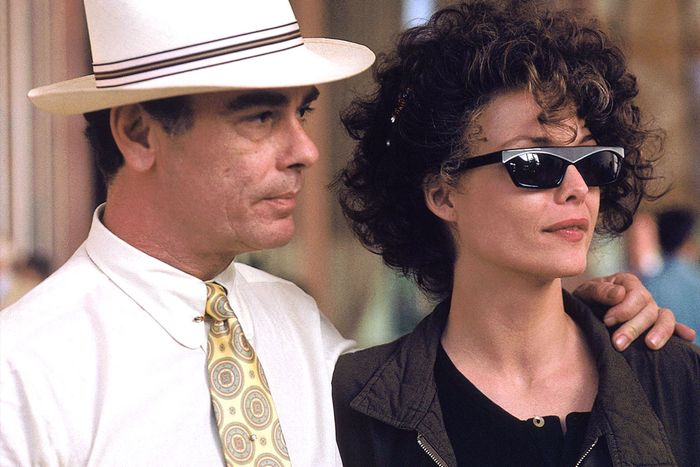
In the outrageous shoot-out that concludes Married to the Mob, the underappreciated 1988 Jonathan Demme comedy, one particular moment encapsulates the greatness of Dean Stockwell, who died on Sunday at age 85. It takes place in the honeymoon suite at a kitschy Miami Beach hotel, where the FBI apprehends Stockwell’s sleazy gangster, Tony “The Tiger” Russo. Tony’s exasperated wife, Connie (the great Mercedes Ruehl), comes a-knocking, gun angled in his direction. Tony tries to talk her down, blathering about how the Feds set him up and insisting they still have a future together. She starts firing. He keeps talking. He wields his cocky smile like a weapon; who needs bullets if you have charm? But when Connie almost blasts him in the arm, Demme cuts to a close-up of Stockwell, whose smile has turned to panic. “Connie, that was close,” he says, shocked. Suddenly, Tony’s entire existence is elucidated. Stockwell confirms him to be a man who has never been told “no,” who has never not used his machismo to wriggle out of a crisis. His dread is our satisfaction.
Married to the Mob earned Stockwell a deserved Oscar nomination, his only. The performance imbues the archetypal sovereignty of a mob boss with a shape-shifting fluidity: When attempting to manipulate potential allies, Stockwell softens Tony’s tone and feigns sympathy. He slows his speech so as to appear contemplative, like when he tries to win over the vulnerable mob widow (Michelle Pfeiffer) entangled in his enterprise, not realizing she is the one manipulating him. Tony’s techniques tend to work, until they don’t. With Connie’s confrontation, Tony’s cleverness vanishes. Was it there in the first place? Throughout the movie, Stockwell has been planting seeds for this reversal of fortune. They bloom at the exact moment the women in his crosshairs achieve comeuppance, by which point we’re waiting for his smugness to get the best of him.
During a long conversation I had with Ruehl last year, she unlocked what makes the showdown between Tony and Connie so bewitching. Despite bullets and bodies alike soaring across the room, the scene feels more like a contest of wits than an action climax. “I had gradually moved into the state of mind that woman might be in, and the thing that made that appearance so big was that her focus was small,” Ruehl explained. “It was on [Tony] and shooting off his cojones. You didn’t have to shout that scene. You just had to be a quiet, scary missile. I think we both recognized that underplaying that moment was where the power was.”
Stockwell often stole scenes while barely raising his voice. He understood intuitively that a supporting actor’s job is to support the film around them — something he did without ever submitting a dull performance. In movies and shows as varied as Long Day’s Journey Into Night, To Live and Die in L.A., Beverly Hills Cop II, The Player, Air Force One, Battlestar Galactica, The Manchurian Candidate (which reunited him with Demme), and Paris, Texas, Stockwell remained one of those reliable Hollywood wizards who elevated whatever material he’d been given. When he shows up as a well-dressed dandy in Blue Velvet, his velvety menace sounds like a whisper next to Dennis Hopper’s belligerent shouting. Playing a judge in The Rainmaker, he dresses down Matt Damon by simply accelerating the speed with which he commands Damon to “get the hell out” of his courtroom.
Our final glimpse of Stockwell in Married to the Mob comes after a short dream sequence. Tony is in prison, having nightmares about Connie castrating him with a revolver. He awakens in a sweat and reaches down to make sure his pecker is still there. The relief that washes over Stockwell’s face makes a mockery of Tony, who seems convinced that because his so-called manhood is intact, his life might be too. We know better, in part because Tony is slated to face a grand jury that probably won’t feel compassion for his many misdeeds. Moreover, we know because Stockwell revealed Tony to be a fool drunk on his own hubris — in other words, he revealed Tony to be a man.

